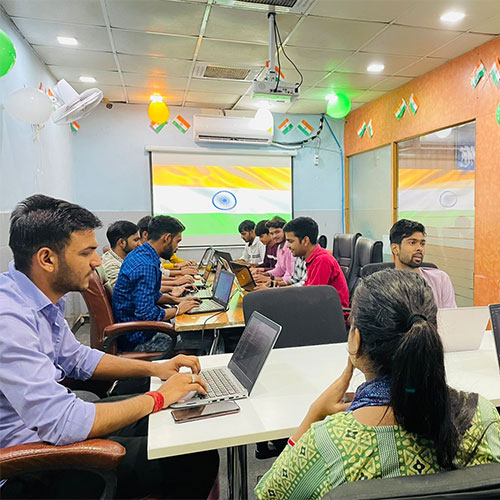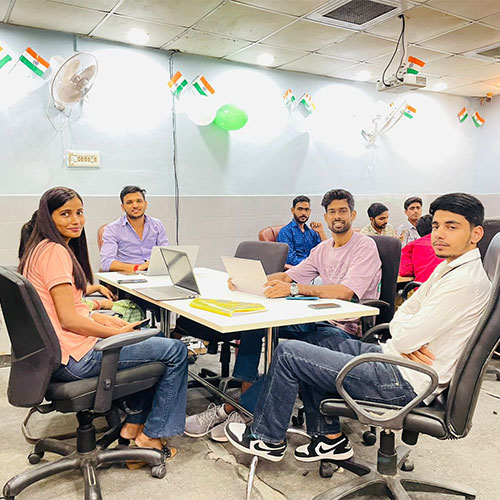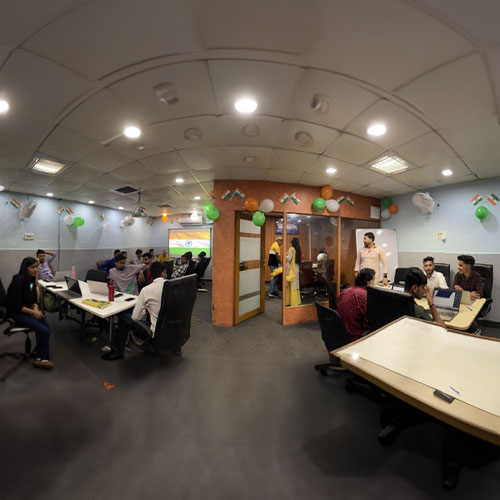What are C and C++?
- C++ is an Oops based programming Language that is powerful and compact. It includes concepts i.e. Polymorphism, Data hiding, Dynamic Binding, Operator encapsulation and inheritance, which are covered in C.
- C languages is known as the mother of all programming languages. It helps a student enter into IT industry and build strong programming skills.
- C++ is advanced to C where students learn Object-Oriented Programming Concepts and enter into the programming world.
- C and C++ Programming is fast data processing language, it used to data transfer over the network.
- C Programming is used on billing, the stock market where programs are mainly on algorithms.
- Linux and Unix Operation system are purely designed on c and C++ language Programming which is the most secure server in the world.
- BigTable, Mysql, and postgress are built in C++ Programming.
- Yahoo, Facebook, and Youtube have c++ backend
Data Structure in C++ Programming
The data structure is a method of storing and organizing system data to use it efficiently. A large number of data including internet indexing services and large databases can be efficiently managed with the data structures. It also plays a major role in designing efficient algorithms and system programs.
Who can attend our C and C++ Training in Gurgaon?
- Fresh Graduates and other job looking students
- Under Graduates, Post Graduates, Graduates Students
- 10th or 10+2 Students
- Those students who want to learn C and C++ also they can join
Here you learn to create programs in C++ Language using Visual Studio
- Write programs with the help of basic elements including control arrays, statements, and strings.
- Edit, compile, execute a simple program.
- Create user-defined functions to understand the code reusability.
- Sorting and Searching Techniques in Data Structure.
- Understand One Dimensional and Two-Dimensional Array
- Common Views of Data Structure such as stacks, queues, and trees.
- Extend class to add more functionality using inheritance and polymorphism in C++.
- Create object Oriented programs in C and C++ language using Visual Studio.
- Use multiple inheritance, inheritance, and functions in applications.
- Processing data using input and output streams
- Operator overloading in C++ programs.
- Exception handling to avoid errors in C++.
- Creating templates for generic programming.
- How to use built-in classes in Standard Template Library.
- Develop application using data types, pointers, and nested functions
After completion of the C and C++ Training course you will be able to: –
- How to apply OOAD to build a C++ application.
- Develop console-based programs using C and C++.
- Creating templates for common algorithms
- Create programs to manipulate and access data in files.
Job Profiles you getting after Completing this, C and C++ Institute in Gurgaon are: –
If you completed your C++ Training in Gurgaon, you can choose a java training or Embedded System Training and become a Software Developer
- If you have good in C++ experience with networking then you can enter into C++ developer,
- If you know C++ embedded systems, then you can enter into Embedded C software engineer.
- If you have C++ with Core Java, then you can get the profile of Core Java Developer.
- If you have C++ skills with ARM, embedded systems and device drivers, you become an Embedded Engineer.
C, C++ Course Fees, and Duration.
The Course fees for C++ Training is very low. We provide convenience to pay in installments. Our Trainer will help you with any issues with time, place and duration The syllabus for the C C++ course in Gurgaon is prepared by keeping in mind the industry’s needs. We update the syllabus regularly basis so that the students will have the confidence to attend the interviews. We also cover both basic and advanced concepts of C and C++ Programming.
C and C++ Training Institute in Gurgaon, FAQ’s
What does the C++ Developer Do?
C++ is a multi-paradigm programming language. C++ Developer work on System Programming, Web Development, Desktop Application using QT, Games, Device Development and Database Management software.
What is the average salary of a C++ professional in Gurgaon?
As per our latest report and survey on Naukri, pay scale or glass door, C++ Professional earns an average salary of 60,000 INR per month. It varies based on city, industry and years of experience.
What roles offered by companies for C, C++ Professionals?
What roles offered by companies for C, C++ Professionals?
- Video Game Designer
- Software Engineer
- C++ Software Engineer
- Java Programmer
- Video Game Programmer
- Software Developer
Why ACIL is the Best C, C++ Training Institute in Gurgaon?
ACIL Computer Education in Gurgaon has been providing the best ever training in c c++ courses in gurgaon. This course has been designed in such a way that students can get the best ever facilities of placement for which they have been getting the admission. ACIL Computer Education is the renowned and one of the most reputed instituitions in Gurgaon. This training institute has been providing placements to the students in Multi-national Companies after the just right after the course. In this institute, students will get both practical and theoretical training.
This whole c++ training in gurgaonat the ACIL Computer Education in Gurgaon will be conducted by the professors who have experience in this field for more than years. Professionals who have been serving the industry will take the practical classes. It has been made so that students can get to learn what the industry has been wanting. The emphasis has been provided on the requirement of the market, and the syllabus has been made according to that. For the sake of the young minds and their dream of landing a great job, the course has been designed so that no student has to sit idle after the completion of the course.
After the completion of the c++ course in gurgaon, it has been guaranteed by the ACIL Computer Education in Gurgaon that students will get the placement. Multi-National Companies are always there to hire students from this institute. A look at the course that has been provided from the ACIL Computer Education in Gurgaon that shaped according to the industry.
Basics of C
- Introduction and Features of C
- Importance of C Language
- What is Procedural Language
- What is Compiler in C Programming, why it used?
- What is Interpreter in C Programming and why it used?
- What is the Structure of an C Programming?
- How to Write a C Programs?
- How to create an Executable File of a C Program?
- How to Debug C Program using GDB?
- Examining undefined behaviour of C Application Program
C and Buzzwords
- Data Type and Variable
- Operators in C
- What is Control Statement
- Pre-processor Directives Input & Output Operator
- Open, Close, Read, Write Files and Characters in C
- What is Formatted input & output Function
Control Statement
- The IF and ELSE Statement
- The IF and ELSE ladder
- Nesting of IF and ELSE Statements
- What is Switch Statements
- What is do-while Statement
- While statement
- FOR Statement
Array in C
- What is Array and Why it used?
- One Dimensions Arrays
- Two Dimensions Arrays
- Multi Dimensions Arrays
- What is Dynamic Arrays
String Handling
- How to read String from Terminal?
- How to write String to Screen?
- String Handling Functions in C Programming
- Table of String
Function in C
- Function and its Basics
- Use of Function
- Recursion
- Variable Storage Classes
- Variable Arguments in Function
Pointers in C
- Understanding Pointers in C Programming
- What is Pointer expressions
- Pointer and Arrays in C Programming
- Pointers & Character String in C Programming
- Pointers to Functions
- Pointers & Structures
- Structures & Unions
Define a Structure
- Advantage of Structure in C
- Size of Structure
- Array of Structures
- Structure and Functions in C
- Define Unions in C
Dynamic Memory allocation
- Introduction to Dynamic Memory Allocation
- Dynamic Memory Allocation in C Programming using malloc(), calloc(), free()
- calloc() vs malloc()
- Linked List
Concepts of Linked Lists
- Creating a Linked Lists
- Inserting/Deleting an item
- Application of Linked Lists
File Management in C
- Introduction about File Management
- How to open & Close a File
- Input & Output operations on Files
- How to Error Handle During I/O Operations?
- What is Command Line Arguments?
Pre-processor
- Macro Substitution using C Programming
- What is File Inclusion
- What is Computer Control Directives?
C++ Syllabus
C++ Introduction and Overview
- What is C++ Characteristics
- Object-Oriented Terminology in C++
- What is Polymorphism
- Object-Oriented Paradigm in C
- Data Types
- Input and Output Services
- Template Library
- Compliance
Functions and Variables
- How to Declare and Define a Function in C++
- Define and Declare a Variable and its Scope
- Dynamic Creation and Derived Data of Variables
- Strings, Number, Boolean and Arrays and in C++
- Qualifiers in C++
Classes in C++
- Define Classes in C++
- Classes & Encapsulation
- Member Functions
- Instantiating and How to use Classes
- What is Constructors & how we use it
- What is multiple Constructors in C++
- Initialization Lists
- How to use destructors to Destroy Instances?
Operator Overloading
- What is Operator Overloading
- Work with Overloaded Operator Methods
Initialization & Assignment
- Initialization vs. Assignment
- Copy Constructor
- Assigning Values
- Specialized Constructors & Method
- Constant & Static Class Member
Storage Management
- Memory Allocation using C++
- Dynamic Allocation in C++
- What is Offline Storage in C++ Programming
Inheritance
- What is Inheritance
- What is Base and Derived Classes and how we define it
- Constructor and Destructor in C++
Polymorphism
- Overview of Polymorphism
- Input and Output Programs using in C++
- What is Standard Streams
- What is Manipulators and use
- Unformatted Input & Output
- File Input & Output
Exceptions
- What is Exceptions Handling
- Inheritance & Exceptions
- Exception Hierarchies
- Inside an Exception Handler
Templates
- About Template Overview
- Customizing a Template
- Standard Template Library
Virtual functions
- Virtual destructors
- Virtual base classes
Virtual base class member access
- Constructor and destructor ordering
Data Structures with C++
- Sorting in C++
- Recursion and List in C++
- List – Single and Double
- Circular Linked List
- Traversing of linked lists
- Queues and Stacks
- How to add two list in c and c++
- Insert a node in the required position
- Delete a node in the required position











